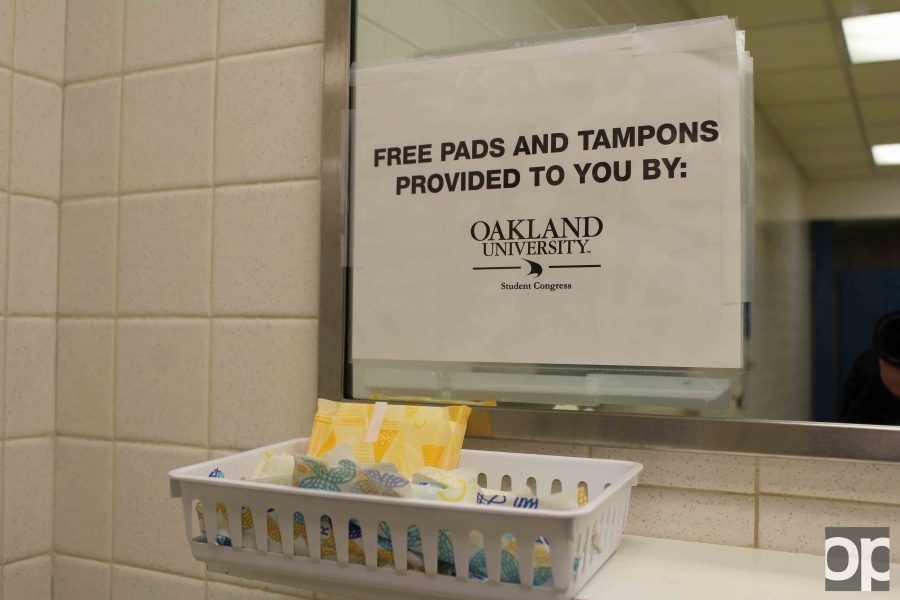The great tampon disappearance
In the women’s restroom in the basement of the Oakland Center, OUSC provides free tampons and pads.
What’s metal, gives false hope and is full of quarters?
The tampon dispensers on campus.
Oakland University has done away with tampon and pad dispensers in recent years. Though some still hang on bathroom walls, the dispensers on campus aren’t usable.
Still, some female students put a few quarters in a dispenser, only to find that nothing comes out. Unless they have time to walk to the bookstore or Oak View Hall, there is no way to quickly get a tampon on campus.
Alex Nelson, a junior majoring in biology, has had some bad days due to the decommissioned dispensers. As a student who frequents Hannah Hall, she has been left without resources.
“I’ve had to miss portions of class before,” she said.
With OU’s student body being primarily female (56.4 percent of the student population was female as of fall 2016), Nelson wishes there was something in place for the female students.
“It’s like not having water fountains or not having a coffee shop,” she said. “It’s something that should be here but isn’t.”
On March 12, 2014, The Oakland Post ran a column in its Police Files describing an incident of vandalism to a dispenser in Elliott Hall. A suspect was never identified, but someone pried the dispenser open and took all of the money inside, leaving behind an open dispenser full of tampons and pads.
Patricia Engle, associate vice president of Facilities Management, said vandalism is why many schools do away with public tampon dispensers. Her last place of work, Lansing Community College, had the same problem.
“People would steal all of the change, steal all of the product, or both, while also breaking the machine,” she said. “Paying the average quarter for a tampon doesn’t even cover the price of the tampon, so we didn’t know how to keep the machines going because those were being broken and are already very expensive on their own.”
Since there are obvious complications when it comes to monitoring bathrooms, the machines had to be put out of use.
“It’s not like these are pop machines where you can see how full they are before you buy something,” Engle said. “So, people would try to buy product and get nothing out. We had larceny issues, but we can’t put cameras in a bathroom or have male police officers monitor the problem.”
Another option was to have feminine hygiene products in a public place on campus, so their distribution could be controlled, but that poses the issue of humiliating students when they have to ask a stranger for a pad or tampon in a public place.
Engle was relieved when she came to OU about three months ago to find that it had also decommissioned the dispensers. Issues related to them consumed a lot of her day at LCC and seemed like an unsolvable problem that a few people were creating for the female portion of the student body.
The only solution OU has right now is the free pads and tampons in the Oakland Center, provided by OU Student Congress. The initiative is part of OUSC’s budget, and staff refill the baskets as often as possible.
OUSC has been providing free feminine hygiene products since February, but has not moved past the OC.
Margaret Merogi, OUSC’s director of student services and the mind behind the initiative, is a student and does not have the time to fill baskets outside of the OC, although this was her original plan.
“Unfortunately, it is impossible for student congress to provide free feminine hygiene products throughout campus at this juncture,” she said. “This is simply because we do not have the manpower to refill every bathroom in every building every day. We love supporting our students and are excited to provide this service to them.”
With the recent amendment to OUSC’s constitution, bringing in students who are not OUSC legislators to help with the initiative could be an option. Part of the amendment allows nonlegislators to be on OUSC committees.
Nelson said, if OUSC’s initiative to provide free feminine hygiene was opened to other students, she would be willing to jump on board.
“Having free [tampons] everywhere on campus would solve such a big problem,” she said. “We pay so much to go here and should be supplied with necessities. I would be willing to help solve the problem because it’s such a big and important job.”








